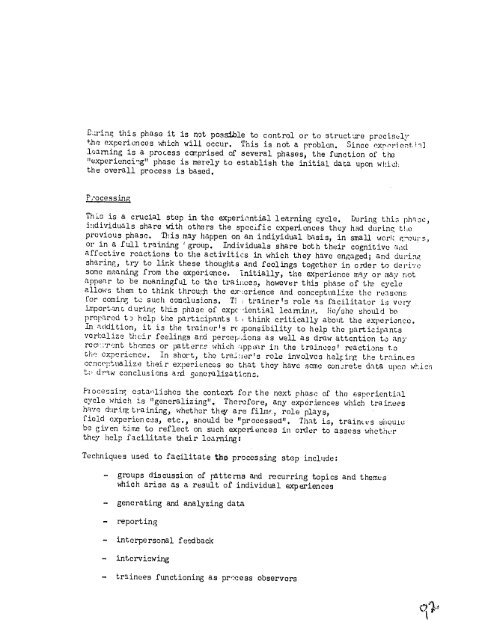Qn VATW Lk WAw LwUiWE WWW M - (PDF, 101 mb) - USAID
Qn VATW Lk WAw LwUiWE WWW M - (PDF, 101 mb) - USAID
Qn VATW Lk WAw LwUiWE WWW M - (PDF, 101 mb) - USAID
Create successful ePaper yourself
Turn your PDF publications into a flip-book with our unique Google optimized e-Paper software.
D£.zing this phase it is not possible to control or to structure precisely<br />
the experiences which will occur. This is not a problem. Since ex.orienti ]<br />
learning is a process car.prised of several phases, the function of the<br />
"experiencing" phase is merely to establish the initial data upon whil.<br />
the overall process is based.<br />
P,'ocessing<br />
This is a crucial step in the experiential learning cycle. During this phae,<br />
individuals share with others the specific experiences they had during t1:e<br />
previous phase. Tis may happen on an indiyidual basis, in small wcri ,ou s,<br />
or in a full training -group. Individuals share both their cognitive and<br />
affective reactions to the activities in which they have engaged; and du-inq<br />
sharing, try to link these thoughts and feelings together in order to derive<br />
some meaning from the experience. Initially, the experience may or ,may riot<br />
appear to be meaningful to the traiices, however this phase of the cycle<br />
alows them to think throug;h the ex'erience and conceptualize the reasons<br />
for comir tc such conclusions. T! i trainer's role as facilitator is very<br />
importoric durinF, this phase of expc iential learnings. He/she should be<br />
prepared t) help the participants t. , think critically about the experience.<br />
In addition, it is the trainer's rc ;ponsibility to help the particiants<br />
verbalize their feelings and percep;,ions as well as draw attention to any<br />
rcc,:rent themes or patternr which :ppo'r in the trainees' reactions to<br />
che experience. In short, the tra.:ier's role involves helping the trainLes<br />
conceptualize their experiences so that they have some con rete data upon whicih<br />
tz, draw conclusions ari generalizations.<br />
Piocessir, estallishes the context for the next phase of the esperiential<br />
cycle which is "generalizing". Therefore, any experiences which trainees<br />
have duriT.training, whether thor are films, role plays,<br />
field experiences, etc., should be "processed". That is, traint.s !i3ouiu<br />
be given time to reflect on such experiences in order to assess whether<br />
they help facilitate their learning:<br />
Techniques used to facilitate the processing step include:<br />
- groups discussion of patterns and recurring topics and themes<br />
which arise as a result of individual experiences<br />
- generating and analyzing data<br />
- reporting<br />
- interpersonal feedback<br />
- interviewing<br />
- trainees functioning as pr,-cess observers

















